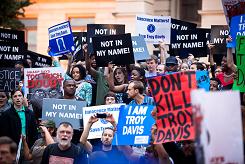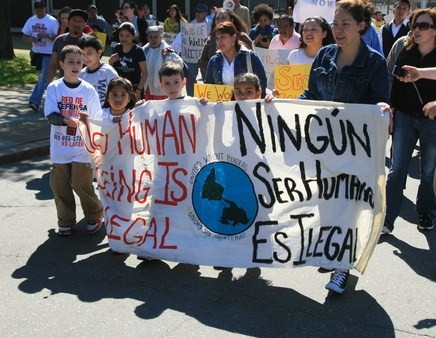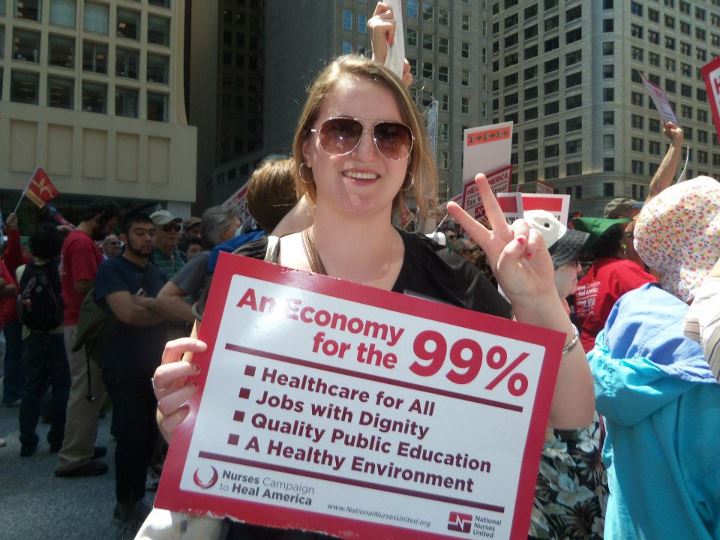
|
| ||||||||||||||||||||||||||
|
On Aug. 31, Caravan for Peace participants held a die-in at Fort Benning, Georgia, to demand closure of the Western Hemisphere Institute for Security Cooperation, a U.S. military training facility formerly known as School of the Americas. Photo by Caravan for Peace. |
Pietro Ameglio is a founder and member of Servicio Paz y Justicia (SERPAJ) – México. The Muste Institute has been supporting SERPAJ, the Service for Peace and Justice, with annual grants from its NOVA Fund since 1998. Pietro wrote this article (translated from the Spanish by Jane Guskin) shortly before joining the Caravan for Peace with Justice and Dignity, which recently toured the U.S. to promote nonviolent action to end the drug war.
Mexico is currently suffering a wave of drug violence which so far has left 60,000 people dead, 10,000 disappeared, and tens of thousands of people displaced from their homes, while intensifying the selective targeting of social justice activists, journalists and human rights defenders.
The drug trade affects all social classes. It is also the largest producer of jobs in Mexico, according to studies by the National Autonomous University of Mexico (UNAM). Perhaps that explains why in the July 1 elections, a significant number of voters chose candidates who promised to continue the current drug war, albeit with more "negotiation by those who know how to do it."
|
In Houston on Aug. 27, poet Javier Sicilia destroys an AK-47 assault rifle in a symbolic protest against gun smuggling. At least 60% of the weapons used by Mexico’s drug cartels come from the United States. Photo by Caravan for Peace. |
Unfortunately this means the model of “armed peace” will continue. In response to crime, we get militarization of the public security forces and an increasing spiral of violence which further feeds the business of war and crime.
Here at SERPAJ – México, we have been working to organize, train and coordinate groups close to the national Movement for Peace with Justice and Dignity (MPJD), with the goal of expanding a culture of nonviolence and building a participatory and horizontal decision-making structure.
|
Caravan for Peace participants march through the streets of Washington, DC with local supporters on Sep. 12, the last day of a month-long tour of the United States calling for an end to the drug war. Photo by Caravan for Peace. |
We collaborated intensively for three months to help organize the National Gathering of Stakeholders of the MPJD, which took place in January with a hundred representatives from nearly 20 Mexican states. Out of that effort emerged a national network of victims’ families, which held its own gathering of 50 family members in April in Cuernavaca, kicking off the MPJD’s 1st National Gathering. The family members were then joined by 300 more people from throughout Mexico and beyond, including many from the United States, for the broader gathering. Participants established a regional representative structure and developed common strategies for supporting the victims’ families, searching for the disappeared and seeking justice for those killed, as well as rebuilding peace in the social fabric of the communities.
During the meeting with victims’ families, we carried out an important nonviolent action: a collective fast on the Mexican Senate floor by family members and members of the MPJD, demanding passage of a victims’ rights law which the legislators were blocking. The action was successful: even before the fast began, lawmakers felt its pressure and passed the bill. For the victims’ families it was an important moment which gave them a sense of their own power, and the power of radical nonviolence, at a moment when they had thought all was lost. Unfortunately, the law was vetoed by the president.
|
Caravan members and local supporters join Mexican poet Javier Sicilia, whose son was a victim of the drug war, at a Sep. 7 press conference on the steps of New York’s City Hall. After the press conference, Sicilia walked into an HSBC bank branch with a suitcase full of blood-stained money, which he asked bank officials to "launder" for him. The caravan targeted HSBC because of its involvement in a money-laundering scandal in Mexico. Photo by Caravan for Peace. |
Another priority for SERPAJ – México has been the organizing of the MPJD caravan in the United States, especially the inclusion of indigenous people. We succeeded in getting nearly 20 representatives of indigenous nations to participate in the caravan, crossing the United States from Aug. 12 to Sep. 12. Their presence as “community victims” whose territory has been stolen from them gives meaning to the other testimonies shared during the caravan, and inspires solidarity among struggles in both countries.
In recent years the SERPAJ “Think Out Loud” Collective has also been carrying out peace and culture actions in the streets as a way of combating fear and organizing resistance among the public. We organized a children’s humor and film project titled “Steps for Peace,” and led workshops on humor, peace and creativity at schools in low-income, high-crime neighborhoods.
We are also participating in the wave of nonviolent resistance that sprang up to protest fraud in the July 1 elections.
|
Political leaders in Uganda come together for the CECORE training. Photo by CECORE Resource Centre. |
Nonviolence Training Grants,
July 2011-June 2012
The Muste Institute’s International Nonviolence Training Fund (INTF) makes grants for nonviolence trainings outside the U.S., or in indigenous communities within the U.S. Guidelines are at ajmuste.org/guideintf.htm. To support INTF grantmaking, indicate “INTF” on the memo line of your check or when designating your online gift to the Muste Institute. Donate today!
Center for Conflict Resolution (CECORE), Kampala, Uganda: $2,000 in December 2011 for a nonviolence skills training with active members and leaders of political parties and other stakeholders in Uganda’s political process.
|
KSCO activists celebrate International Conscientious Objectors’ Day with a "Pedal for Peace" event on May 15, 2012. Photo by KSCO. |
Korea Solidarity for Conscientious Objection (KSCO), Seoul, South Korea: $4,000 in June 2012 for a Training for Trainers, scheduled for October 2012, to build a local network of nonviolence trainers and increase popular awareness of nonviolent activism in Korea.
|
At the RUPS training in Cairo, refugees work on strategies for facilitating sessions. Photo by Kathy Kamphoefner. |
Refugees United for Peaceful Solutions (RUPS), Cairo, Egypt: $3,000 in April 2012 for "The Practice of Active Nonviolence: Training for Trainers," a 10-week program in Cairo empowering 12 trainers with practical organizing skills to help their communities engage in nonviolent campaigns. The participants are refugees from Sudan, Eritrea, and Somalia. refugees4peace.org
Mural Celebrates A.J.'s Legacy
|
Muste Institute board member Nina Streich reads a message from board chair Peter Muste at the August 9 installation of a new mural at the Peace Pentagon. The mural depicts A.J. Muste and others singing over a pile of broken rifles, below a banner reading “There is no way to peace, peace is the way.” (See more here.)
About 50 people attended. Artist Christopher Cardinale told how he came to create the mural; board member David McReynolds spoke about A.J.’s role in the peace movement; members of tenant organizations spoke about their social justice organizing work; and local musician Eve Silber (pictured here with guitar) got the crowd singing along to anti-war songs. Because the event was held on the anniversary of the U.S. atomic bombing of Nagasaki, participants also observed a moment of silence to remember the victims. Photo by David McReynolds.
|
|
Education for Liberation Network produced this plan book for social justice teachers in collaboration with New York Collective of Radical Educators, another past Muste Institute grantee. |
Social Justice Fund Grants, June 2012 The Muste Institute’s Social Justice Fund makes grants for grassroots activist projects in the U.S. and around the world. If supporting nonviolent action for social justice is important to you, please donate now to help us expand this important program. Thank you! Austin Immigrant Rights Coalition, Austin, TX: $1,500 (via Austin Community Foundation) to challenge the collaboration between federal immigration authorities and local law enforcement through political education, leadership development, and building strategic alliances to expand the power of grassroots social action. austinirc.org Education for Liberation Network, Chicago, IL: $1,500 (via Chicago Freedom School) for Education for Liberation Circles, bringing together people from across the country who are involved in education justice issues to determine how the work they are doing in their own communities can be more effectively connected. edliberation.org Georgians For Alternatives to the Death Penalty helped organize this vigil at the Capitol in Atlanta on Sep. 21, 2011, to demand a stay of execution for Troy Davis. Georgia executed Davis despite the protests—and despite substantial evidence pointing to his innocence—but the state killing galvanized public sentiment against the death penalty. Photo by Scott Langley. Georgians For Alternatives to the Death Penalty, Atlanta, GA: $1,500 (via Southern Center for Human Rights) for the Grassroots Initiative for Organizing and Transformation Project, supporting community leaders of color in developing local policy campaigns, educating the public, and building a membership base to advance fairness and respect for human rights in the criminal justice system. gfadp.org Olneyville Neighborhood Association, Providence, RI: $1,500 for grassroots organizing and education to build a statewide movement in Rhode Island to demand that local police stop holding and transferring immigrants to federal immigration custody. onaprovidence.org Members of Olneyville Neighborhood Association march for immigrant rights on May 1, 2011. Photo by Olneyville Neighborhood Association. Peace Action Fund of New York State, New York, NY: $2,000 for stipends to support two student interns working to develop and promote nonviolent activism for peace and justice among New York students. panys.org Steering Committee for the Honor Program/The Other Death Penalty Project, Lancaster, CA: $2,000 (via Catalyst Foundation) for the mailing and promotion of “Too Cruel, Not Unusual Enough,” an anthology of stories from prisoners serving life sentences without possibility of parole. theotherdeathpenalty.org Julia Stry, student organizer at the State University of New York (SUNY) Geneseo campus, represents Peace Action New York State at the national nurses union rally that kicked off the NATO Counter Summit in Chicago on May 18, 2012. Photo by Kathryn Rahill.


